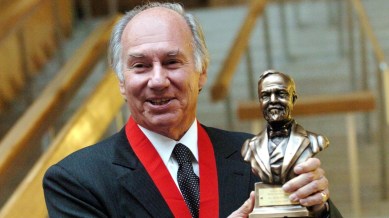Who was The Aga Khan, spiritual leader and philanthropist, who passed away at 88?
A direct descendant of the Prophet Muhammad, Khan was the founder and chairman of the Aga Khan Development Network.

The Aga Khan, who emerged as the spiritual leader of the world’s millions of Ismaili Muslims, and a philanthropist, “passed away peacefully” in Lisbon, surrounded by his family, on Tuesday, the official website of the Aga Khan Development Network (AKDN) announced.
Prince Karim Al-Hussaini, the Aga Khan IV was the 49th hereditary Imam (spiritual leader) of the Shia Ismaili Muslims, who had dedicated his efforts towards improving the quality of life of the most vulnerable populations across the world, according to AKDN.
monthly limit of free stories.
with an Express account.
A direct descendant of the Prophet Muhammad, Khan was the founder and chairman of the AKDN.
Who was The Aga Khan?
Born on December 13, 1936, in Creux-de-Genthod, near Geneva, Switzerland, Khan was the son of Joan Yarde-Buller and Aly Khan. He spent part of his childhood in Nairobi, Kenya, according to the Ismaili community’s website.
Now survived by three sons and a daughter and several grandchildren, Khan will be buried in Lisbon.
Khan had left Harvard University to be by his ailing grandfather, Sir Sultan Mahomed Shah Aga Khan’s side, and later succeeded him at the age of 20, as Imam of the Ismaili Muslims in 1957.
He returned to school 18 months later with an entourage and a deep sense of responsibility, as described by the Associated Press report.
Treated as a head of state, the Aga Khan was given the title of “His Highness” by Queen Elizabeth in July that year, two weeks after his grandfather unexpectedly made him heir to the family’s 1,300-year dynasty as leader of the Ismaili Muslim sect, AP reported.
A spiritual leader
As a spiritual leader, Khan advocated for Islam as a thinking, spiritual faith – one that teaches compassion and tolerance and that upholds human dignity, the AKDN website highlighted.
He was regarded as a builder of bridges between Muslim societies and the West despite — or perhaps because of — his reticence to become involved in politics, the AP report noted.
The Ismailis, a Muslim sect, are a global, multi-ethnic community whose members, comprising a diversity of cultures, languages and nationalities, live in Central Asia, the Middle East, South Asia, sub-Saharan Africa, Europe and North America.
A philanthropist
Khan’s charitable work includes setting up of healthcare, educational and cultural projects, within the larger body of AKDN, which is based in Switzerland.
To name a few, the development agencies include the Aga Khan Health Services, Aga Khan Schools, the Aga Khan Agency for Microfinance, the Aga Khan Foundation, Aga Khan Agency for Habitat as well as two universities, the Aga Khan University and the University of Central Asia.
The Network works in over 30 countries and has an annual budget of about $1 billion for such nonprofit development activities.
Khan had received numerous awards and honorary degrees from across the world, in recognition of his “exceptional efforts and contributions to human development and improving the social condition of societies globally,” as per the website.
Soon after Khan passed away, the Secretary-General of the United Nations, extended his “deepest condolences” to his family, and the Ismaili community. In an official statement, the spokesperson wrote: “The Aga Khan’s leadership extended beyond his role as the Imam of the Shia Ismaili Muslims. He was a bridge-builder between cultures and faiths, promoting mutual understanding and respect in an increasingly interconnected world. His efforts to address poverty, advance gender equality, and foster sustainable development have left an indelible mark on the global community.”
“The United Nations recognizes the Aga Khan’s invaluable contributions to the advancement of the Sustainable Development Goals (SDGs) and his partnership with the UN in addressing some of the world’s most pressing challenges,” the statement read.
His India connection
Besides his social development ventures that currently run in India, Khan was also invited to the country to commemorate the Diamond Jubilee of his Imamat, and inaugurate the Sunder Nursery in Delhi in 2018.
Moreover, in September 2013, Khan had visited India to inaugurate the restored 16th Century Humayun’s Tomb in New Delhi.
Khan was conferred the Padma Vibhushan, the second highest civilian award in India, during a civil investiture ceremony at the presidential palace in New Delhi in 2015.
Khan’s other endeavours
Khan was known to have an estimated fortune of $1billion (£801m) in 2008, BBC quoted the Forbes magazine, which was boosted by business interests, including horse-breeding.
His horse Shergar won the Derby at Epsom in 1981. Khan then went on to win the big race four more times with Shahrastani (1986), Kahyasi (1986), Sinndar (2000) and Harzand (2016), the report stated.
According to an AP report, Khan also represented Iran in the 1964 Winter Olympics as a skier.